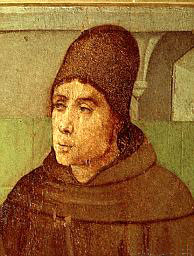
How we define evil is influenced by our core beliefs. Materialists and some scientists dismiss the idea of evil as if it were culturally inherited from a world once peopled by believers in magic and outdated superstitions.
Today, violent criminals are usually depicted in psychiatric terms. Murderers are reported as having a mental illness instead of being possessed by Satan. However, callous murderers are sometimes called “monsters,” so the idea of evil still creeps into our predominantly scientific worldview.
Evil in Christian theology
In Christianity a theological distinction exists between natural evil and moral evil. Natural evil includes “acts of God” (for example, tsunamis, earthquakes and avalanches. Moral evil is a conscious human choice to turn away from God’s will thereby participating in some action harmful to self and possibly others (for example, spying on a friend for political gain or career advancement).
The Scottish theologian Duns Scotus said intrinsic evil involves acts that are inherently evil and accordingly prohibited. Intrinsically evil acts are not evil because they are prohibited. They’re just bad in themselves.
For Christians, evil is often taken as a necessary component of God’s plan of salvation. Christians accept as an article of faith that God permits evil for some greater good. However, this greater good is usually beyond the comprehension of mere mortals (see Isaiah 55:8-9). So Christians must believe. They may have reason to believe. But still, their faith comes down to belief above knowledge.
A Christian school of thought, initiated by St. Irenaeus and popularized by John Hick, emphasizes that evil is permitted, but not caused, by God.

Why would an all-powerful God permit evil to happen? According to the Irenian school, the answer is found in the concept of soul-making. Soul making refers to the notion that a soul freely choosing to abstain from evil is of greater value than a soul that would automatically avoid evil like a programmed robot. The free, good soul apparently better glorifies God than a sinless automaton would.
Although evil may ravage, test and torment good souls alive and embodied on Earth, the ultimate goal of our finite, earthly life is to be made worthy of everlasting, heavenly life. From this perspective the evils of the world act as a crucible. Souls not succumbing to but resisting evil are purified and strengthened toward the good. Evil, then, is necessary. It acts as a kind of hammer, constantly pounding out the soul’s impurities.
St. Thomas Aquinas writes:
This is part of the infinite goodness of God, that he should allow evil to exist, and out of it produce good.¹
Aquinas also says, in keeping with the notion of a final winnowing of the Apocalypse (Luke 3:17, Matthew 3:12):
God permits some evils lest the good things should be obstructed.²
This quote has to do with the belief, often heard in Catholic homilies, that it’s easier to separate the good from the bad (wheat from the chaff) after each has fully developed. Essentially, the New Testament uses familiar parables to try to explain things that human beings are too limited to understand.
Another Christian view, influenced by Plato‘s idea of the Forms, comes from St. Augustine. Augustine sees evil as a privatio boni, which in Latin means the absence of good. According to this idea, God is good, therefore evil must exist where God is not present. God does not create evil. Rather, it is a choice. At this point the theological debates can get complicated, and some ask whether Augustine’s theodicy (defence of God’s goodness with the reality of evil) holds up for both natural and moral evil.
Different branches of Christianity hold different views about what happens to evil souls in the afterlife. Some Churches damn sinners eternally. Martin Luther, for instance, believed that some souls are predestined for hell. Some contemporary Christians pray for the liberation of souls in hell while others do not.³ And the Catholic concept of Purgatory is neither a heaven nor hell, but a difficult preparation for heaven.
Evil in non-Christian religion
Embed from Getty Images
Evil in Islam is similar to the Christian idea. But for Muslims, it is evil to suggest that Christ is one with God (John 10:30). And the prohibitions in the Koran differ from those of the New Testament. Notably, killing is permitted in the Koran in some circumstances4, whereas the very thought of killing is denounced in the New Testament. Many branches of Christianity do, however, support the idea of the Just War (just as in justice).
Hinduism presents a different view of evil. Evil is permitted to maintain the right balance of sacred heat or power (tapas) within the universe. Aspects of Hinduism speak to the reality of hell for evildoers. But evil in Hinduism is mostly viewed in terms of personal ignorance and spiritual development. So hellish punishments are temporary instead of eternal.
According to this belief, the evil soul reincarnates on earth until it is cleansed of the ignorance that influenced it to do bad things. This differs from the Catholic teaching that souls in hell are eternally damned and, some say, would never want to leave. Unlike the Christian, the Hindu aspires to transcend ideas about good and evil through an experiential knowledge of universal truth. This is a big Good beyond smaller goods and evils.
Accordingly, the ultimate goal of Hinduism differs from both the Christian and Islamic goals. For the Hindu, heaven is a halfway house on the road to ultimate realization. The reincarnating soul may enjoy periodic visits to different heavens but, though the round of rebirth, it eventually transcends all heavens to ultimately achieve the greatest good of the Brahman. A similar but in some ways different view of evil is found in Taoism.
An interesting but routinely overlooked question is whether Christian, Jewish, Islamic, Buddhist, Taoist and Hindu heavens and hells are identical in character. The Romanian scholar Mircea Eliade notes that heavens and hells are described differently among world religions. But do they all feel the same? The answer to this question I think depends on the person and where they’re at in their journey.
Most global cultures at some point in history have seen evil as a cause of mental or physical illness. This belief is prevalent in Shamanism. And some religious writers, such as the Catholic, Michael Brown, say they feel the presence of evil almost anywhere.
For W. H. Auden, evil is inferior to good because
Good can imagine Evil; but Evil cannot imagine Good.5
And that’s why I believe good will always overcome evil in the long run. It’s smarter, more insightful and has access to a wider vista of knowledge and experience.
—
¹ http://www.aquinasonline.com/Topics/probevil.html
² See » Google Books
³ See this excellent discussion: http://forums.catholic.com/showthread.php?t=329730
4 See http://www.yoel.info/koranwarpassages.htm
5 W. H. Auden, A Certain World
Related Posts » Determinism, Free-will, Shamanism, Siva, Suffering, Trickster











“There has to be evil so that good can prove its purity above it.”
-Hindu Prince Gautama Siddharta, the founder of Buddhism, 563-483 B.C.
Wether or not I believe in Evil is not the issue, it is the acts themselves we focus on. Evil as a notion greater than the purpose. It leaves little to the supernatural when it all comes down to it… for what proof have we of evil outside of intentions and actions?
LikeLike
Enreal, I always appreciate your interesting comments…
There are those who believe that they have the gift of ‘discernment.’ This means they apparently can differentiate between (a) the good powers acting on and through a person (b) the evil powers acting on and through a person and (c) that person’s true self. So I think this opens the door to the supernatural and its importance for everyday life.
I must stress that not all supernatural forces are regarded as bad! But if it’s true that demons constantly try to deceive and destroy us (because they’re just bad), then we’d better be aware of that.
Some say that the devil’s oldest trick is to make people think he doesn’t exist.
LikeLike
Very well stated!!! Left me nodding my head smiling. Kudos
LikeLike
”the form of a Jihad (holy war)”
Jihad does not mean holy war!!!!
u and ur “western” interpretations of arabic words, god help you!!!
LikeLike
According to Wikipedia some interpretations of Jihad, particularly legal ones, advocate war, which to my mind is similar to the Christian idea of a “Just War.”
http://en.wikipedia.org/wiki/Jihad
But I take your point that word itself means “strive” or “struggle” and thank you for correcting me.
Please realize that this is an ongoing project. The very fact that I say “report errors” implies that there will be some.
—
I just made an edit…
LikeLike
[…] Blogged, and blogged, and again. […]
LikeLike
[…] Blogged, and blogged, and once more. […]
LikeLike
[…] Evil (earthpages.wordpress.com) […]
LikeLike